La Fondation est impliquée et/ou contribue à la publication de livres, d’articles et de numéros spéciaux de revues. Ces publications résultent souvent de colloques ou de manifestations qui ont été soutenus par la Fondation.
Voici un choix de quelques-unes de ces publications.
State-Building in the Middle East and North Africa
Edited by Mohammad-Mahmoud Ould Mohamedou
London: I. B. Tauris, Routledge, 2022
This book is the result of the 2017 Annual Pierre du Bois Conference “Elusive State-Building: The Middle East and North Africa, 1917-2017”. The below text includes the book’s back cover and an excerpt from the Editor’s Acknowledgements.
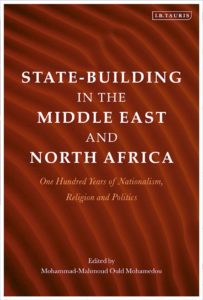 Why has the search for the state been difficult for so long in the Middle East and North Africa?
Why has the search for the state been difficult for so long in the Middle East and North Africa?
Following the end of the Ottoman Empire in the early 1920s, the countries of the region were thrown into the throes of a violent and divisive process of state-formation. A century later, state-building remains inconclusive. As nationalist and Islamist movements initially competed for political leadership across the nascent systems, the military established and kept its grip on the security apparatus and on national economies. After independence, the post-colonial state revealed itself authoritarian and formed on the model of the colonial state. As the Arab Spring and its conflict-filled aftermath played out, and external powers reasserted their interventionism, regional states remained hollow and devoid of legitimacy.
This book examines the reasons behind the failure to establish viable and lasting states in the Middle East and North Africa. Why so little statehood? Why so much conflict?
This book originated with an international conference held on 27-28 September 2017 at the Graduate Institute of International and Development Studies in Geneva, Switzerland. Examining the question of ‘Elusive State-Building: The Middle East and North Africa. 1917-2017’. The conference was organized as part of the Annual Pierre du Bois Conference, an event jointly convened by the Pierre du Bois Foundation and the Department of International History and Politics at the Graduate Institute.
Edited and authored by Mohammad-Mahmoud Ould Mohamedou, this volume features contributions by Lisa Anderson, Faleh Abdul Jabar, Bertrand Badie, François Burgat, Benoît Challand, Ahmad Khalidi, Henry Laurens, Bruce Rutherford, Jordi Tejel and Ghassan Salamé.
Truth, Silence, and Violence in Emerging States: Histories of the Unspoken
Edited by Aidan Russell
London: Routledge, 2019
This book is the result of the 2016 Annual Pierre du Bois Conference “Histories of the Unspoken: Truth, Silence and Violence in Emerging States“. Below is text by the editor.
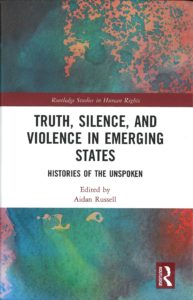 Around the world in the twentieth century, political violence in emerging states gave rise to different kinds of silence within their societies. The product of the 2016 Pierre du Bois annual conference for international history, this book explores the histories of these silences, how they were made, maintained, evaded, and transformed. It presents a wide-ranging view of the ongoing evolutions and multiple faces of silence as a common strand in the struggles of state-building. It begins with chapters that examine the construction of “regimes of silence” as an act of power, and it continues through explorations of the ambiguous limits of speech within communities marked by this violence. It highlights national and transnational attempts to combat state silences, before concluding with a series of considerations of how these regimes of silence continue to be extrapolated in the gaps of records and written history. In this manner, it brings together the diverse experiences of Cold War Latin America and Indonesia with decolonisation conflicts and postcolonial violence in Africa, civilian life in Saddam Hussein’s Iraq, historical debates in the post-Stalinist USSR, and a century of denial around the Armenian genocide. In the different faces of silence, a unique conversation emerges: the composed silences of political violence are not solely a present concern of aftermath or retrospection, but a diachronic social and political dimension of violence itself.
Around the world in the twentieth century, political violence in emerging states gave rise to different kinds of silence within their societies. The product of the 2016 Pierre du Bois annual conference for international history, this book explores the histories of these silences, how they were made, maintained, evaded, and transformed. It presents a wide-ranging view of the ongoing evolutions and multiple faces of silence as a common strand in the struggles of state-building. It begins with chapters that examine the construction of “regimes of silence” as an act of power, and it continues through explorations of the ambiguous limits of speech within communities marked by this violence. It highlights national and transnational attempts to combat state silences, before concluding with a series of considerations of how these regimes of silence continue to be extrapolated in the gaps of records and written history. In this manner, it brings together the diverse experiences of Cold War Latin America and Indonesia with decolonisation conflicts and postcolonial violence in Africa, civilian life in Saddam Hussein’s Iraq, historical debates in the post-Stalinist USSR, and a century of denial around the Armenian genocide. In the different faces of silence, a unique conversation emerges: the composed silences of political violence are not solely a present concern of aftermath or retrospection, but a diachronic social and political dimension of violence itself.
Aidan Russell
New Perspectives on the End of the Cold War. Unexpected Transformations?
Edited by Bernhard Blumenau, Jussi M. Hanhimäki, Barbara Zanchetta
London: Routledge, 2018
This book is the result of the 2015 Annual Pierre du Bois Conference “The Great Transformation? Reassessing the Causes and Consequences of the End of the Cold War“. Below is the book’s acknowledgment text.
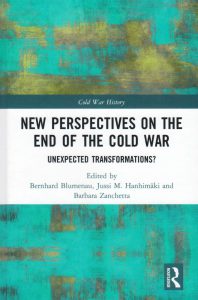
Bringing about this edited book has been an exciting experience with a history of its own. Most of the chapters originated as papers that were presented during the annual Pierre du Bois Foundation Conference organized at the Graduate Institute of International and Development Studies in Geneva. In addition to the Graduate Institute and the many scholars who participated in the conference, we owe a further debt to a number of institutions and individuals. Most important, we would like to express our deepest gratitude to the Pierre du Bois Foundation for the generous financial support that made the conference possible. We are particularly grateful for the president of the foundation, Irina du Bois, without whom there would be no foundation and, hence, no conference series at the Graduate Institute or an edited book of this kind. The Swiss National Foundation provided additional funding for our conference that – along with the efforts of Riina Turtio of the Graduate Institute – guaranteed its success. Lisa Komar took on – and successfully completed – the editing of the chapters for this book. Our friends at Routledge – particularly Hannah Ferguson and Andrew Humphrys – guided the book towards its publication with their unparalleled efficiency and enthusiasm.
Bernhard Blumenau, Jussi M. Hanhimäki, and Barbara Zanchetta
Economic Development and Environmental History in the Anthropocene. Perspectives on Asia and Africa
This book is the result of the 2014 Annual Pierre du Bois Conference “Economic Development in the Anthropocene. Perspectives on Asia and Africa“. Below is the book’s preface.
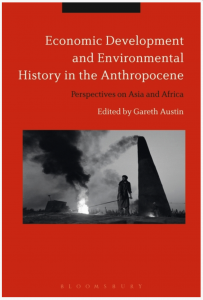
This book stemmed from a belief that, in a time when open-minded citizens around the globe have become more aware than ever of the often unstable interactions between human activity and our physical environment, economic historians and environmental historians, together with colleagues from economics and geography, need to work more closely together in research and teaching. The project was born in Geneva, at the Graduate Institute of International and Development Studies, with a small conference on 26-27 September 2014, generously funded by the Pierre du Bois Foundation for Current History. I am delighted to pay tribute to the support of the board of the Foundation, and especially Irina du Bois, who invited the proposal for the conference, assisted with the arrangements and attended both the conference itself and the accompanying public forum. Valerie van Daeniken and Gabriel Geisler Mesevage of the lnstitute’s Department of lnternational History provided excellent organizational support. While most of the chapters were first presented at that conference, l am particularly grateful to three conference participants who, seeing the way our collective discussions had developed, very kindly decided to write new and very different essays for the book: Tirthankar Roy, Kaoru Sugihara and Julia Adeney Thomas. I am equally grateful to Peter Boomgaard and Emily Osborn, who gracefully agreed to join the project after the conference. Indeed, I am extremely appreciative of the whole team of authors, who contributed so much time in a very self-disciplined manner, and of Bloomsbury Academic, in the persons of Emma Goode and initially also Claire Lipscomb, who encouraged us throughout. l also thank the publishers’ anonymous reviewers, who not only made the right recommendation but also provided extremely shrewd and constructive criticism that has helped us improve the cohesion and content of the book. Finally, I pay tribute to my wife, Pip Austin, who did much of the initial copy-editing and the majority of the indexing, and did her best to keep the editor relatively sane.
Gareth Austin
Geneva and Cambridge, December 2016
The Fragments Imagine the Nation? Minorities in the Modern Middle East and North Africa
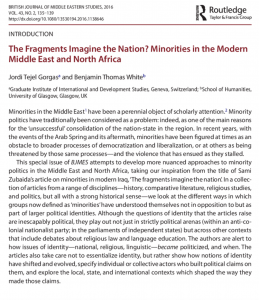 This special issue of British Journal of Middle Eastern Studies has its origins in a workshop entitled “The Fragments Imagine the Nation? Minorities in the colonial and postcolonial Middle East” which took place in November 2013 at the Graduate Institute in Geneva, with the support of the Fondation Pierre du Bois. It was organized by Professor Jordi Tejel from the Graduate Institute and Professor Benjamin Thomas White from Birmingham University. In this special issue of BJMES, the authors attempted to develop nuanced approaches to minority politics in the Middle East. They do this in a collection of articles from a range of disciplines such as history, comparative literature, religious studies, and politics.
This special issue of British Journal of Middle Eastern Studies has its origins in a workshop entitled “The Fragments Imagine the Nation? Minorities in the colonial and postcolonial Middle East” which took place in November 2013 at the Graduate Institute in Geneva, with the support of the Fondation Pierre du Bois. It was organized by Professor Jordi Tejel from the Graduate Institute and Professor Benjamin Thomas White from Birmingham University. In this special issue of BJMES, the authors attempted to develop nuanced approaches to minority politics in the Middle East. They do this in a collection of articles from a range of disciplines such as history, comparative literature, religious studies, and politics.
Neutrality and Neutralism in the Global Cold War: Between or within the blocs?
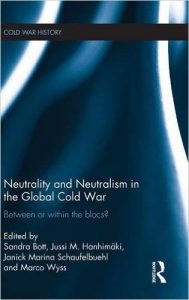 This book is the result of our support of the 2014 Conference “The Role of the Neutrals and Non-Aligned in the Global Cold War, 1949-1989,” co-organized by Professor Jussi M. Hanhimäki of the Graduate Institute and University of Lausanne’s Professor Janick Marina Schaufelbuehl, Dr Sandra Bott, and Dr Marco Wyss. Three have been several projects that have explored the role of the third-world in the Cold War, particularly since 2015. However, the significance of neutral countries in general, and Switzerland in particular, during the Cold War in the third-world has, as of yet, garnered little research. It is in an effort to address these gaps that the three publications from this international conference were issued.
This book is the result of our support of the 2014 Conference “The Role of the Neutrals and Non-Aligned in the Global Cold War, 1949-1989,” co-organized by Professor Jussi M. Hanhimäki of the Graduate Institute and University of Lausanne’s Professor Janick Marina Schaufelbuehl, Dr Sandra Bott, and Dr Marco Wyss. Three have been several projects that have explored the role of the third-world in the Cold War, particularly since 2015. However, the significance of neutral countries in general, and Switzerland in particular, during the Cold War in the third-world has, as of yet, garnered little research. It is in an effort to address these gaps that the three publications from this international conference were issued.
The same conference also resulted in two further publications.
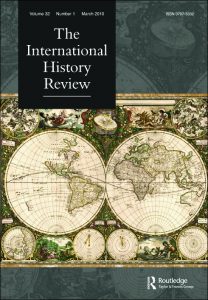 A special issue entitled “Beyond and Between the Cold War Blocs” appeared in The International History Review.
A special issue entitled “Beyond and Between the Cold War Blocs” appeared in The International History Review.
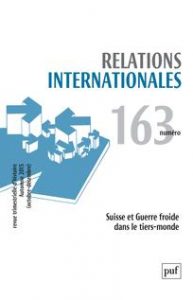 A second special issue entitled “Suisse et Guerre froide dans le tiers-monde,” in Relations Internationales, was published in 2015 (Issue 3, Number 163).
A second special issue entitled “Suisse et Guerre froide dans le tiers-monde,” in Relations Internationales, was published in 2015 (Issue 3, Number 163).
Transnational Anti-Communism and the Cold War
 This book is the result of the 2011 Conference “Les dimensions transnationales de l’anticommunisme de guerre froide : actions, réseaux, transferts,” organized by the Université de Fribourg with the support of the Fondation Pierre du Bois. The book covers the aims, arguments, and associations of a range of transnational anti-communist activists during the Cold War. It demonstrates the complex array of forces, factions and frictions that were active during the Cold War, and explores new fields of research regarding how far anti-communism was actually planned, coordinated, and structured across Western nations.
This book is the result of the 2011 Conference “Les dimensions transnationales de l’anticommunisme de guerre froide : actions, réseaux, transferts,” organized by the Université de Fribourg with the support of the Fondation Pierre du Bois. The book covers the aims, arguments, and associations of a range of transnational anti-communist activists during the Cold War. It demonstrates the complex array of forces, factions and frictions that were active during the Cold War, and explores new fields of research regarding how far anti-communism was actually planned, coordinated, and structured across Western nations.
The 2011 Conference’s “Rapport scientifique” is available here.
An International History of Terrorism: Western and non-Western Experiences
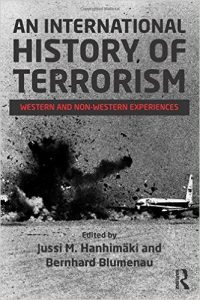 This book is the result of the 2011 Annual Pierre du Bois Conference “Terrorism and International Politics: Past, Present, and Future“.
This book is the result of the 2011 Annual Pierre du Bois Conference “Terrorism and International Politics: Past, Present, and Future“.
Europe Twenty Years after the End of the Cold War: The New Europe, New Europes?
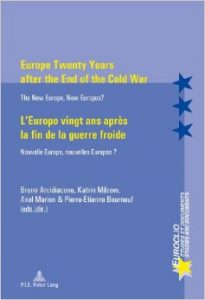
This book is the result of the 2010 Annual Pierre du Bois Conference “Europe Twenty Years after the End of the Cold War: The New Europe, New Europes?“.
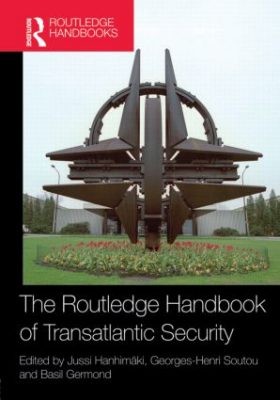 This book is the result of the 2009 Annual Pierre du Bois Conference “Transatlantic Security Issues from the Cold War to the 21st Century“.
This book is the result of the 2009 Annual Pierre du Bois Conference “Transatlantic Security Issues from the Cold War to the 21st Century“.
